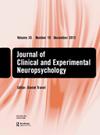SOD1 基因突变的 ALS 患者的认知障碍。
IF 1.7
4区 心理学
Q3 CLINICAL NEUROLOGY
Journal of clinical and experimental neuropsychology
Pub Date : 2024-09-11
DOI:10.1080/13803395.2024.2393366
引用次数: 0
摘要
目的肌萎缩性脊髓侧索硬化症(ALS)患者,尤其是 C9ORF72HRE 基因突变携带者,常见认知能力下降。然而,人们对导致肌萎缩侧索硬化症的其他基因突变携带者的认知功能障碍知之甚少。我们对 SOD1(mSOD1)基因突变患者进行了全面的神经心理学测试。结果SOD1 基因突变携带者和散发性 ALS 患者都有周身障碍,但其模式不同于 C9ORF72HRE。所有群体都存在工作记忆障碍,但在一项涉及复制复杂图形的注意力驱动型视觉空间任务中,mSOD1 基因携带者的表现明显优于散发性 ALS 和 C9ORF72HRE。除复杂工作记忆外,D90A-SOD1 基因突变携带者的总体表现与其他 SOD1 基因突变携带者相同或更好。贝叶斯分析表明(中等强度的证据),涉及语言领域的任务在对照组、mSOD1 和散发性 ALS 之间没有差异。基因型不同,损伤的类型和程度也不同,而在同源的 D90A SOD1 基因突变患者中,损伤的类型和程度明显最轻。认知障碍的存在可能会影响最佳临床管理和干预。我们建议,认知评估应纳入 ALS 新疑似患者的常规检查中。神经心理学评估是临床药物试验中一项未得到充分认识的结果参数。本文章由计算机程序翻译,如有差异,请以英文原文为准。
Cognitive deficits in ALS patients with SOD1 mutations.
OBJECTIVE
Cognitive decline is common in patients with amyotrophic lateral sclerosis (ALS), especially in carriers of the mutation C9ORF72HRE. However, cognitive impairment is poorly understood in carriers of mutations in other genes causing ALS. We performed a comprehensive neuropsychological testing in patients with mutations in the SOD1 (mSOD1) gene.
METHODS
We examined 5 cognitive domains in 48 symptomatic patients with either hereditary or sporadic ALS. These were compared with 37 matched controls.
RESULTS
Carriers of SOD1-mutations and sporadic ALS had circumscribed deficits, but in a pattern different from C9ORF72HRE. All groups had deficits in working memory, although mSOD1-carriers significantly outperform sporadic ALS and C9ORF72HRE in an attention-driven visuospatial task involving copying a complex figure. Carriers of the D90A-SOD1 mutation overall performed as well as or better than carriers of other SOD1-mutations, except complex working memory. Bayesian analyses suggest (with evidence of moderate strength) that tasks involving the language domain did not differ between controls, mSOD1 and sporadic ALS.
CONCLUSION
Distinct cognitive impairments are prevalent in different ALS-syndromes and vary in patients with different pathogenic SOD1 mutations. The type and degree of impairment differed depending on genotype and was significantly least pronounced in patients homozygous for the D90A SOD1 mutation. The presence of cognitive deficits may influence optimal clinical management and intervention. We propose that cognitive assessment should be included in the routine examination of new patients suspected of ALS. Neuropsychological assessment is an under-recognized outcome parameter in clinical drug trials.
求助全文
通过发布文献求助,成功后即可免费获取论文全文。
去求助
来源期刊
CiteScore
3.20
自引率
4.50%
发文量
52
审稿时长
6-12 weeks
期刊介绍:
Journal of Clinical and Experimental Neuropsychology ( JCEN) publishes research on the neuropsychological consequences of brain disease, disorders, and dysfunction, and aims to promote the integration of theories, methods, and research findings in clinical and experimental neuropsychology. The primary emphasis of JCEN is to publish original empirical research pertaining to brain-behavior relationships and neuropsychological manifestations of brain disease. Theoretical and methodological papers, critical reviews of content areas, and theoretically-relevant case studies are also welcome.

 求助内容:
求助内容: 应助结果提醒方式:
应助结果提醒方式:


